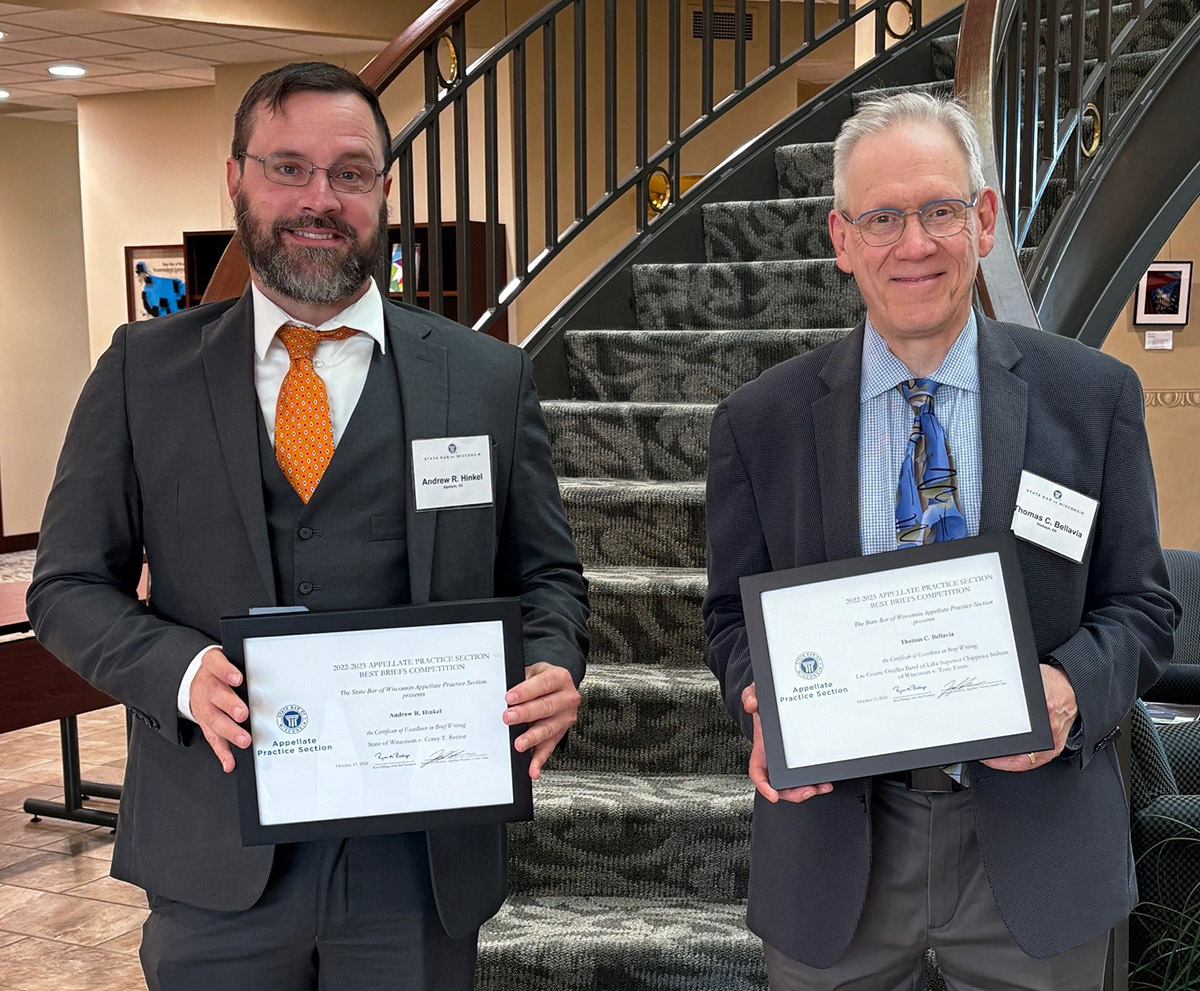
Oct. 2, 2024 – Fans of appellate writing nominated 66 appellate briefs for consideration in the Appellate Practice Section’s 2024 Best Briefs Competition.
The biennial brief-writing competition recognizes outstanding writing and appellate advocacy.
This is the fifth time the section has held the competition, created in 2016 with three goals in mind: To recognize great writers, to promote appellate advocacy, and to identify briefs that can be used as models for new and improving appellate lawyers.
The competition also provides an opportunity for members of the Appellate Practice Section who serve as brief screeners to review and discuss effective appellate advocacy.
 Christina Plum, UW 1995, is the chief staff attorney for the Wisconsin Court of Appeals and served as the chair of the 2024 Best Briefs Competition Committee.
Christina Plum, UW 1995, is the chief staff attorney for the Wisconsin Court of Appeals and served as the chair of the 2024 Best Briefs Competition Committee.
“We had a record number of submissions for this year’s competition,” said Joseph S. Diedrich, section chair. “Members of the Wisconsin appellate bar put forth some really high-quality briefs, so identifying the very best proved to be a difficult – but enjoyable – task. The section is really proud to honor two deserving winners this year.”
The two winners of the 2024 contest are:
Thomas Bellavia, formerly of the Wisconsin Department of Justice, for
the response brief filed in the United States Court of Appeals for the Seventh Circuit in Lac Courte Oreilles Band of Lake Superior Chippewa Indians of Wisconsin v. Evers. Bellavia was also a winner in the
2016 Best Briefs Competition.
Andrew Hinkel, formerly of the State Public Defender’s Office, for
the appellant-cross-respondent’s brief filed in the Wisconsin Supreme Court in State v. Rector.
Asked to share their advice on effective appellate writing, Bellavia and Hinkel offered the following recommendations.
Thomas Bellavia:
“Use clarity and logic in conveying your position to the court. Begin with a plain and concise statement of the basic legal principles underlying your case. Each subsequent step in the argument should follow logically from those preceding. At the end, the reader should feel compelled to reach the conclusion for which you are advocating.
“In contending with opposing arguments do not set up and knock down paper tigers. Judges are smart and will find the strengths in your opponent’s arguments, so you should not try to make those arguments appear weaker than they really are. Present the other side’s position fairly and convince the court that your arguments are better than the strongest arguments on the other side. Whether you win or lose, this approach best serves the sound development of the law.”
Andrew Hinkel:
“I think a conversational style makes for much more enjoyable reading (or maybe just less painful reading) than a highly formal or technical style. And you want to be readable, because you want your brief read (and remembered). Part of this is tone – using the simplest language that conveys your point, and sentences of varied, but shortish, length.
“But another part is structural – if you were explaining something complicated to a friend, you’d want them to know from the beginning why it was useful to know. You’d also try to foresee and address potential questions or confusion along the way. In legal writing, you can do the same.
“You can tell the reader where you’re going, and why it’s important to go there, with a summary of the argument up front. And along the way, you can pull the reader in by being explicit about why the brief is, for example, addressing Issue B before issue A, or why it’s taking what may at first appear to be a tangent. As a reader, it’s harder to absorb an argument if you’re wondering why it’s even there, or if you’re worried that the point
you care about isn’t going to be addressed.”

Winners of the 2024 Best Briefs competition, honored at a reception on Oct. 17, 2024: Andrew Hinkel (left) and Thomas Bellavia (right).
Judging the Competition
Appellate briefs filed in cases decided in 2022 and 2023 were eligible for the 2024 competition. Some briefs were nominated by their authors and others were nominated by attorneys who found the briefs compelling.
This year, eight members of the Appellate Practice Section reviewed the briefs and identified 16 outstanding briefs to advance to the final stage of the competition.
Three retired state court judges, including former Supreme Court Justice Janine P. Geske and former Court of Appeals Judges Paul F. Reilly and Jeffrey O. Davis, reviewed the finalists.
The briefs were evaluated for clarity of writing, depth of analysis, and persuasiveness, and not on the apparent merits of any issue. The judges ultimately decided to recognize two briefs as the winners of the year’s competition.
The Next Competition
The 2026 Best Briefs Competition will include briefs filed in cases decided in 2024 and 2025. For information on nominating a brief for the sixth competition, visit the section’s competition website in early 2025. The section also welcomes volunteers interested in screening briefs for the next competition.
